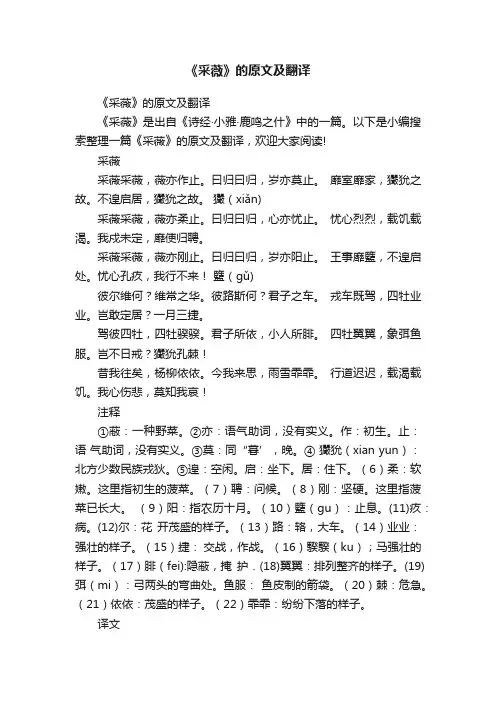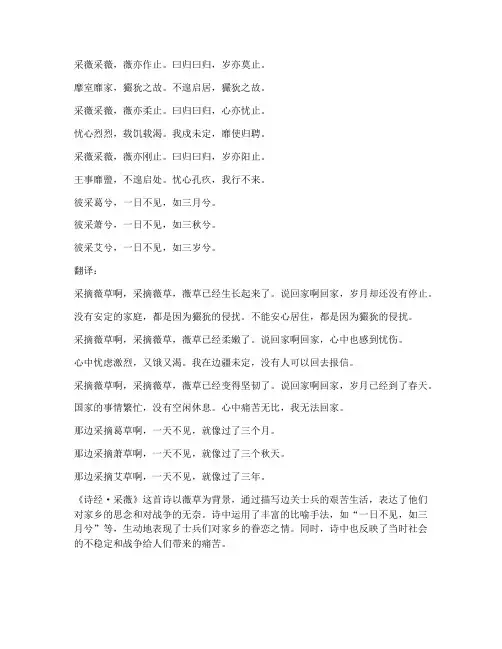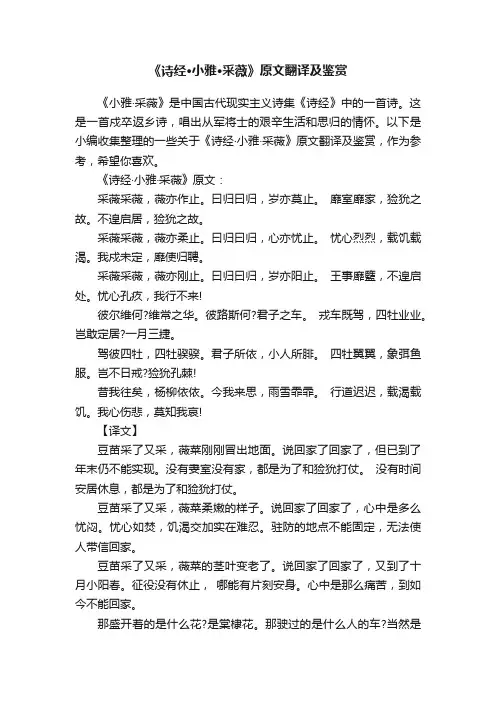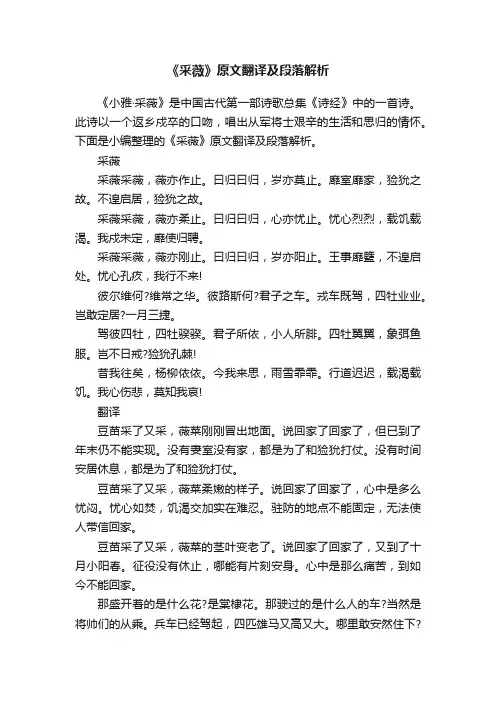《诗经·小雅·采薇》的汉英翻译
- 格式:doc
- 大小:97.50 KB
- 文档页数:16

《采薇》的原文及翻译《采薇》的原文及翻译《采薇》是出自《诗经·小雅·鹿鸣之什》中的一篇。
以下是小编搜索整理一篇《采薇》的原文及翻译,欢迎大家阅读!采薇采薇采薇,薇亦作止。
曰归曰归,岁亦莫止。
靡室靡家,玁狁之故。
不遑启居,玁狁之故。
玁(xiǎn)采薇采薇,薇亦柔止。
曰归曰归,心亦忧止。
忧心烈烈,载饥载渴。
我戍未定,靡使归聘。
采薇采薇,薇亦刚止。
曰归曰归,岁亦阳止。
王事靡盬,不遑启处。
忧心孔疚,我行不来!盬(gǔ)彼尔维何?维常之华。
彼路斯何?君子之车。
戎车既驾,四牡业业。
岂敢定居?一月三捷。
驾彼四牡,四牡骙骙。
君子所依,小人所腓。
四牡翼翼,象弭鱼服。
岂不日戒?玁狁孔棘!昔我往矣,杨柳依依。
今我来思,雨雪霏霏。
行道迟迟,载渴载饥。
我心伤悲,莫知我哀!注释①蔽:一种野菜。
②亦:语气助词,没有实义。
作:初生。
止:语气助词,没有实义。
③莫:同“暮’,晚。
④ 玁狁(xian yun):北方少数民族戎狄。
⑤遑:空闲。
启:坐下。
居:住下。
(6)柔:软嫩。
这里指初生的菠菜。
(7)聘:问候。
(8)刚:坚硬。
这里指菠菜已长大。
(9)阳:指农历十月。
(10)盬(gu):止息。
(11)疚:病。
(12)尔:花开茂盛的样子。
(13)路:辂,大车。
(14)业业:强壮的样子。
(15)捷:交战,作战。
(16)騤騤(ku);马强壮的样子。
(17)腓(fei):隐蔽,掩护.(18)翼翼:排列整齐的样子。
(19)弭(mi):弓两头的弯曲处。
鱼服:鱼皮制的箭袋。
(20)棘:危急。
(21)依依:茂盛的样子。
(22)霏霏:纷纷下落的样子。
译文采薇菜啊采薇菜,薇菜刚才长出来。
说回家啊说回家,一年又快过去了。
没有妻室没有家,都是因为玁狁故。
没有空闲安定下,都是因为玁狁故。
采薇菜啊采薇菜,薇菜初生正柔嫩。
说回家啊说回家,心里忧愁又烦闷。
心中忧愁像火烧,饥渴交加真难熬。
我的驻防无定处,没法托人捎家书。
采薇菜啊采薇菜,薇菜已经长老了。

采薇原文与翻译采薇原文与翻译采薇通过归途的追述集中表现戍卒们久戍难归、忧心如焚的内心世界,从而表现周人对战争的厌恶和反感。
以下是采薇原文与翻译,一起来看一下吧。
采薇原文采薇采薇,薇亦作止。
曰归曰归,岁亦莫止。
靡室靡家,玁狁(xiǎnyǔn)之故。
不遑启居,玁狁之故。
采薇采薇,薇亦柔止。
曰归曰归,心亦忧止。
忧心烈烈,载饥载渴。
我戍未定,靡使归聘。
采薇采薇,薇亦刚止。
曰归曰归,岁亦阳止。
王事靡盬(gǔ),不遑启处。
忧心孔疚,我行不来!彼尔维何?维常之华。
彼路斯何,君子之车。
戎车既驾,四牡业业。
岂敢定居?一月三捷。
驾彼四牡,四牡骙骙(kuí)。
君子所依,小人所腓。
四牡翼翼,象弭鱼服。
岂不日戒?玁狁孔棘!昔我往矣,杨柳依依。
今我来思,雨(yù)雪霏霏。
行道迟迟,载渴载饥。
我心伤悲,莫知我哀!采薇注释(1)薇:豆科野豌豆属的一种,学名救荒野豌豆,现在叫大巢菜,种子、茎、叶均可食用。
(2)作:指薇菜冒出地面。
(3)止:句末助词。
(4)曰:句首、句中助词,无实意。
(5)莫:通“暮”,也读作“暮”。
本文指年末。
(6)靡(mǐ)室靡家:没有正常的家庭生活。
靡,无。
室,与“家”义同。
(7)不遑(huáng):不暇。
遑,闲暇。
(8)启居:跪、坐,指休息、休整。
启,跪、跪坐。
居,安坐、安居。
古人席地而坐,两膝着席,危坐时腰部伸直,臀部与足离开;安坐时臀部贴在足跟上。
(9)玁(xiǎn)狁(yǔn):中国古代少数民族名。
(10)柔:柔嫩。
“柔”比“作”更进一步生长。
指刚长出来的薇菜柔嫩的样子。
(11)烈烈:炽烈,形容忧心如焚。
(12)载(zài)饥载渴:则饥则渴、又饥又渴。
载……载……,即又……又……。
(13)戍(shù):防守,这里指防守的地点。
(14)聘(pìn):问,谓问候。
(15)刚:坚硬。
(16)阳:农历十月,小阳春季节。
今犹言“十月小阳春”。
(17)靡:无。

采薇采薇,薇亦作止。
曰归曰归,岁亦莫止。
靡室靡家,玁狁之故。
不遑启居,玁狁之故。
采薇采薇,薇亦柔止。
曰归曰归,心亦忧止。
忧心烈烈,载饥载渴。
我戍未定,靡使归聘。
采薇采薇,薇亦刚止。
曰归曰归,岁亦阳止。
王事靡盬,不遑启处。
忧心孔疚,我行不来。
彼采葛兮,一日不见,如三月兮。
彼采萧兮,一日不见,如三秋兮。
彼采艾兮,一日不见,如三岁兮。
翻译:
采摘薇草啊,采摘薇草,薇草已经生长起来了。
说回家啊回家,岁月却还没有停止。
没有安定的家庭,都是因为玁狁的侵扰。
不能安心居住,都是因为玁狁的侵扰。
采摘薇草啊,采摘薇草,薇草已经柔嫩了。
说回家啊回家,心中也感到忧伤。
心中忧虑激烈,又饿又渴。
我在边疆未定,没有人可以回去报信。
采摘薇草啊,采摘薇草,薇草已经变得坚韧了。
说回家啊回家,岁月已经到了春天。
国家的事情繁忙,没有空闲休息。
心中痛苦无比,我无法回家。
那边采摘葛草啊,一天不见,就像过了三个月。
那边采摘萧草啊,一天不见,就像过了三个秋天。
那边采摘艾草啊,一天不见,就像过了三年。
《诗经·采薇》这首诗以薇草为背景,通过描写边关士兵的艰苦生活,表达了他们对家乡的思念和对战争的无奈。
诗中运用了丰富的比喻手法,如“一日不见,如三月兮”等,生动地表现了士兵们对家乡的眷恋之情。
同时,诗中也反映了当时社会的不稳定和战争给人们带来的痛苦。

《诗经·小雅·采薇》原文翻译及鉴赏《小雅·采薇》是中国古代现实主义诗集《诗经》中的一首诗。
这是一首戍卒返乡诗,唱出从军将士的艰辛生活和思归的情怀。
以下是小编收集整理的一些关于《诗经·小雅·采薇》原文翻译及鉴赏,作为参考,希望你喜欢。
《诗经·小雅·采薇》原文:采薇采薇,薇亦作止。
曰归曰归,岁亦莫止。
靡室靡家,猃狁之故。
不遑启居,猃狁之故。
采薇采薇,薇亦柔止。
曰归曰归,心亦忧止。
忧心烈烈,载饥载渴。
我戍未定,靡使归聘。
采薇采薇,薇亦刚止。
曰归曰归,岁亦阳止。
王事靡盬,不遑启处。
忧心孔疚,我行不来!彼尔维何?维常之华。
彼路斯何?君子之车。
戎车既驾,四牡业业。
岂敢定居?一月三捷。
驾彼四牡,四牡骙骙。
君子所依,小人所腓。
四牡翼翼,象弭鱼服。
岂不日戒?猃狁孔棘!昔我往矣,杨柳依依。
今我来思,雨雪霏霏。
行道迟迟,载渴载饥。
我心伤悲,莫知我哀!【译文】豆苗采了又采,薇菜刚刚冒出地面。
说回家了回家了,但已到了年末仍不能实现。
没有妻室没有家,都是为了和猃狁打仗。
没有时间安居休息,都是为了和猃狁打仗。
豆苗采了又采,薇菜柔嫩的样子。
说回家了回家了,心中是多么忧闷。
忧心如焚,饥渴交加实在难忍。
驻防的地点不能固定,无法使人带信回家。
豆苗采了又采,薇菜的茎叶变老了。
说回家了回家了,又到了十月小阳春。
征役没有休止,哪能有片刻安身。
心中是那么痛苦,到如今不能回家。
那盛开着的是什么花?是棠棣花。
那驶过的是什么人的车?当然是将帅们的从乘。
兵车已经驾起,四匹雄马又高又大。
哪里敢安然住下?因为一个月多次交战!驾起四匹雄马,四匹马高大而又强壮。
将帅们坐在车上,士兵们也靠它隐蔽遮挡。
四匹马训练得已经娴熟,还有象骨装饰的弓和鲨鱼皮箭囊(指精良的装备)。
怎么能不每天戒备呢?猃狁之难很紧急啊。
回想当初出征时,杨柳依依随风吹。
如今回来路途中,大雪纷纷满天飞。
道路泥泞难行走,又饥又渴真劳累。

诗经采薇翻译及解析采薇是一首戎卒返乡诗,唱出从军将士的艰辛生活和思归的情怀。
下面是小编推荐给大家的诗经采薇翻译及解析,希望大家有所收获。
诗经采薇采薇采薇,薇亦作止。
曰归曰归,岁亦莫止。
靡室靡家,玁狁之故。
不遑启居,玁狁之故。
采薇采薇,薇亦柔止。
曰归曰归,心亦忧止。
忧心烈烈,载饥载渴。
我戍未定,靡使归聘。
采薇采薇,薇亦刚止。
曰归曰归,岁亦阳止。
王事靡盬,不遑启处。
忧心孔疚,我行不来!彼尔维何?维常之华。
彼路斯何?君子之车。
戎车既驾,四牡业业。
岂敢定居?一月三捷。
驾彼四牡,四牡骙骙。
君子所依,小人所腓。
四牡翼翼,象弭鱼服。
岂不日戒?玁狁孔棘!昔我往矣,杨柳依依。
今我来思,雨雪霏霏。
行道迟迟,载渴载饥。
我心伤悲,莫知我哀!诗经采薇翻译采薇采薇一把把,薇菜新芽已长大。
说回家呀道回家,眼看一年又完啦。
有家等于没有家,为跟玁狁去厮杀。
没有空闲来坐下,为跟玁狁来厮杀。
采薇采薇一把把,薇菜柔嫩初发芽。
说回家呀道回家,心里忧闷多牵挂。
满腔愁绪火辣辣,又饥又渴真苦煞。
防地调动难定下,书信托谁捎回家!采薇采薇一把把,薇菜已老发杈枒。
说回家呀道回家,转眼十月又到啦。
王室差事没个罢,想要休息没闲暇。
满怀忧愁太痛苦,生怕从此不回家。
什么花儿开得盛?棠棣花开密层层。
什么车儿高又大?高大战车将军乘。
驾起兵车要出战,四匹壮马齐奔腾。
边地怎敢图安居?一月要争几回胜!驾起四匹大公马,马儿雄骏高又大。
将军威武倚车立,兵士掩护也靠它。
四匹马儿多齐整,鱼皮箭袋雕弓挂。
哪有一天不戒备,军情紧急不卸甲!回想当初出征时,杨柳依依随风吹;如今回来路途中,大雪纷纷满天飞。
道路泥泞难行走,又渴又饥真劳累。
满心伤感满腔悲。
我的哀痛谁体会!诗经采薇的解析一、第一部分:借物起兴,表达了兵士的凄苦心情这首诗的第一部分从“采薇采薇”到“忧心孔疚,我行不来”重复三章,每章都以“采薇采薇”开头,这是《诗经》中常用的表达手法,即用重章叠句的方式来反复表达同一个主题,在这首诗中即是兵士的行役之苦。

《诗经·采薇》原文翻译及作品赏析《诗经·采薇》原文翻译及作品赏析古诗和文言文翻译是高考必考的内容之一,所以平时学习过程中要注意积累。
古诗文翻译要以直译为主,并保持语意通畅,而且应注意原文用词造句和表达方式的特点。
以下《诗经·采薇》原文及翻译仅供参考,请大家以所在地区课本为主。
《诗经·采薇》原文采薇采薇,薇亦作止。
曰归曰归,岁亦莫止。
靡室靡家,猃狁之故。
不遑启居,猃狁之故。
采薇采薇,薇亦柔止。
曰归曰归,心亦忧止。
忧心烈烈,载饥载渴。
我戍未定,靡使归聘。
采薇采薇,薇亦刚止。
曰归曰归,岁亦阳止。
王事靡盬,不遑启处。
忧心孔疚,我行不来!彼尔维何?维常之华。
彼路斯何?君子之车。
戎车既驾,四牡业业。
岂敢定居?一月三捷。
驾彼四牡,四牡骙骙。
君子所依,小人所腓。
四牡翼翼,象弭鱼服。
岂不日戒?猃狁孔棘!昔我往矣,杨柳依依。
今我来思,雨雪霏霏。
行道迟迟,载渴载饥。
我心伤悲,莫知我哀!《诗经·采薇》原文翻译豆苗采了又采,薇菜刚刚冒出地面。
说回家了回家了,但已到了年末仍不能实现。
没有妻室没有家,都是为了和猃狁打仗。
没有时间安居休息,都是为了和猃狁打仗。
豆苗采了又采,薇菜柔嫩的样子。
说回家了回家了,心中是多幺忧闷。
忧心如焚,饥渴交加实在难忍。
驻防的地点不能固定,无法使人带信回家。
豆苗采了又采,薇菜的茎叶变老了。
说回家了回家了,又到了十月小阳春。
征役没有休止,哪能有片刻安身。
心中是那幺痛苦,到如今不能回家。
那盛开着的是什幺花?是棠棣花。
那驶过的是什幺人的车?当然是将帅们的从乘。
兵车已经驾起,四匹雄马又高又大。
哪。

采薇采薇采薇,薇亦作止。
曰归曰归,岁亦莫止。
靡家靡室,玁狁之故。
不遑启居,猃狁之故。
采薇采薇,薇亦柔止。
曰归曰归,心亦忧止。
忧心烈烈,载饥载渴。
我戍未定,靡使归聘。
采薇采薇,薇亦刚止。
曰归曰归,岁亦阳止。
王事靡盬,不遑启处。
忧心孔疚,我行不来。
彼尔维何?维常之华。
彼路斯何?君子之车。
戎车既驾,四牡业业。
岂敢定居,一月三捷。
驾彼四牡,四牡骙骙。
君子所依,小人所腓。
四牡翼翼,象弭鱼服。
岂不日戒,猃狁孔棘。
昔我往矣,杨柳依依。
今我来思,雨雪霏霏。
行道迟迟,载饥载渴。
我心伤悲,莫知我哀。
【译文】采薇采薇一把把,薇菜新芽已长大。
说回家呀道回家,眼看一年又完啦。
有家等于没有家,为跟玁狁去厮杀。
没有空闲来坐下,为跟玁狁来厮杀。
采薇采薇一把把,薇菜柔嫩初发芽。
说回家呀道回家,心里忧闷多牵挂。
满腔愁绪火辣辣,又饥又渴真苦煞。
防地调动难定下,书信托谁捎回家!采薇采薇一把把,薇菜已老发杈枒。
说回家呀道回家,转眼十月又到啦。
王室差事没个罢,想要休息没闲暇。
满怀忧愁太痛苦,生怕从此不回家。
什么花儿开得盛?棠棣花开密层层。
什么车儿高又大?高大战车将军乘。
驾起兵车要出战,四匹壮马齐奔腾。
边地怎敢图安居?一月要争几回胜!驾起四匹大公马,马儿雄骏高又大。
将军威武倚车立,兵士掩护也靠它。
四匹马儿多齐整,鱼皮箭袋雕弓挂。
哪有一天不戒备,军情紧急不卸甲!回想当初出征时,杨柳依依随风吹;如今回来路途中,大雪纷纷满天飞。
道路泥泞难行走,又渴又饥真劳累。
满心伤感满腔悲。
我的哀痛谁体会!猃(xiǎn,上声)狁(yǔn,上声),即北狄,匈奴。
不遑,不暇。
启,跪、危坐。
居,安坐、安居。
古人席地而坐,故有危坐、安坐的分别。
无论危坐和安坐都是两膝着席,危坐(跪)时腰部伸直,臀部同足离开;安坐时则将臀部贴在足跟上。
柔,柔嫩。
“柔”比“作”更进一步生长。
烈烈,犹炽烈。
载饥载渴,则饥则渴;即又饥又渴。
戍,防守。
定,止。
聘,问,谓问候。
刚,坚硬。
阳,十月为阳。

采薇课文翻译采薇课文翻译采薇一般指小雅·采薇。
《小雅·采薇》是中国古代第一部诗歌总集《诗经》中的一首诗。
下面是小编为大家整理的采薇课文翻译,希望对大家有所帮助。
采薇课文翻译采薇采薇采薇,薇亦作止。
曰归曰归,岁亦莫止。
靡室靡家,玁狁之故。
不遑启居,玁狁之故。
采薇采薇,薇亦柔止。
曰归曰归,心亦忧止。
忧心烈烈,载饥载渴。
我戍未定,靡使归聘。
采薇采薇,薇亦刚止。
曰归曰归,岁亦阳止。
王事靡盬,不遑启处。
忧心孔疚,我行不来。
彼尔维何?维常之华。
彼路斯何?君子之车。
戎车既驾,四牡业业。
岂敢定居?一月三捷。
驾彼四牡,四牡骙骙。
君子所依,小人所腓。
四牡翼翼,象弭鱼服。
岂不日戒,玁狁孔棘。
昔我往矣,杨柳依依。
今我来思,雨雪霏霏。
行道迟迟,载渴载饥。
我心伤悲,莫知我哀!注释(1)薇:豆科野豌豆属的一种,学名救荒野豌豆,又叫大巢菜,种子、茎、叶均可食用。
《史记卷六十一伯夷列传》记载:“武王已平殷乱,天下宗周,而伯夷、叔齐耻之,义不食周粟,隐于首阳山,采薇而食之。
”[4] 说的是伯夷、叔齐隐居山野,义不仕周的故事。
《史记周本纪第四》记载:懿王之时,王室遂衰,诗人作刺。
刺就是指《采薇》。
《汉书·匈奴传》记载:至穆王之孙懿王时,王室遂衰,戎狄交侵,暴虐中国。
中国被其苦,诗人始作,疾而歌之,曰:“‘靡室靡家,猃狁之故’,‘岂不日戒,猃狁孔棘’。
”(2)作:指薇菜冒出地面。
(3)止:句末助词,无实意。
(4)曰:句首、句中助词,无实意。
(5)莫:通“暮”,也读作“暮”。
本文指年末。
(6)靡(mǐ)室靡家:没有正常的家庭生活。
靡,无。
室,与“家”义同。
(7)不遑(huáng):不暇。
遑,闲暇。
(8)启居:跪、坐,指休息、休整。
启,跪、跪坐。
居,安坐、安居。
古人席地而坐,两膝着席,危坐时腰部伸直,臀部与足离开;安坐时臀部贴在足跟上。
(9)猃(xiǎn)狁(yǔn):中国古代少数民族名。
(10)柔:柔嫩。

《采薇》原文翻译及段落解析《小雅·采薇》是中国古代第一部诗歌总集《诗经》中的一首诗。
此诗以一个返乡戍卒的口吻,唱出从军将士艰辛的生活和思归的情怀。
下面是小编整理的《采薇》原文翻译及段落解析。
采薇采薇采薇,薇亦作止。
曰归曰归,岁亦莫止。
靡室靡家,猃狁之故。
不遑启居,猃狁之故。
采薇采薇,薇亦柔止。
曰归曰归,心亦忧止。
忧心烈烈,载饥载渴。
我戍未定,靡使归聘。
采薇采薇,薇亦刚止。
曰归曰归,岁亦阳止。
王事靡盬,不遑启处。
忧心孔疚,我行不来!彼尔维何?维常之华。
彼路斯何?君子之车。
戎车既驾,四牡业业。
岂敢定居?一月三捷。
驾彼四牡,四牡骙骙。
君子所依,小人所腓。
四牡翼翼,象弭鱼服。
岂不日戒?猃狁孔棘!昔我往矣,杨柳依依。
今我来思,雨雪霏霏。
行道迟迟,载渴载饥。
我心伤悲,莫知我哀!翻译豆苗采了又采,薇菜刚刚冒出地面。
说回家了回家了,但已到了年末仍不能实现。
没有妻室没有家,都是为了和猃狁打仗。
没有时间安居休息,都是为了和猃狁打仗。
豆苗采了又采,薇菜柔嫩的样子。
说回家了回家了,心中是多么忧闷。
忧心如焚,饥渴交加实在难忍。
驻防的地点不能固定,无法使人带信回家。
豆苗采了又采,薇菜的茎叶变老了。
说回家了回家了,又到了十月小阳春。
征役没有休止,哪能有片刻安身。
心中是那么痛苦,到如今不能回家。
那盛开着的是什么花?是棠棣花。
那驶过的是什么人的车?当然是将帅们的从乘。
兵车已经驾起,四匹雄马又高又大。
哪里敢安然住下?因为一个月多次交战!驾起四匹雄马,四匹马高大而又强壮。
将帅们坐在车上,士兵们也靠它隐蔽遮挡。
四匹马训练得已经娴熟,还有象骨装饰的弓和鲨鱼皮箭囊(指精良的装备)。
怎么能不每天戒备呢?猃狁之难很紧急啊。
回想当初出征时,杨柳依依随风吹。
如今回来路途中,大雪纷纷满天飞。
道路泥泞难行走,又饥又渴真劳累。
满腔伤感满腔悲,我的哀痛谁体会!写作背景《采薇》是出自《诗经·小雅·鹿鸣之什》中的一篇。
历代注者关于它的写作年代说法不一。

诗经《采薇》的原文及翻译诗经《采薇》的原文及翻译采薇采薇采蔽①,该亦作止②。
曰归曰归,岁亦莫止③。
靡室靡家,玁狁之故④。
不遑启居⑤,玁狁之故。
采薇采薇,蔽亦柔止(6)。
曰归曰归,心亦忧止。
忧心烈烈,载饥载渴。
我戍未定,靡使归聘(7)。
采薇采薇,薇亦刚止(8)。
曰归曰归,岁亦阳止(9)。
王事靡盬(10),不遑启处。
忧心孔疚(11),我行不来。
彼尔维何(12),维常之华。
彼路斯何(13),君子之车。
戎车既驾,四牡业业(14)。
岂敢定居,一月三捷(15)。
驾彼四牡,四牡騤騤(16)。
君子所依,小人所腓(17)。
四牡翼翼(18),象弭鱼服(19)。
岂不日戒,玁狁孔棘(20)。
昔我往矣,杨柳依依(21).今我来思,雨雪霏霏(22)。
行道迟迟,载渴载饥。
我心伤悲,莫知我衷。
①蔽:一种野菜。
②亦:语气助词,没有实义。
作:初生。
止:语气助词,没有实义。
③莫:同暮,晚。
④玁狁(xianyun):北方少数民族戎狄。
⑤遑:空闲。
启:坐下。
居:住下。
(6)柔:软嫩。
这里指初生的菠菜。
(7)聘:问候。
(8)刚:坚硬。
这里指菠菜已长大。
(9)阳:指农历十月。
(10)盬(gu):止息。
(11)疚:病。
(12)尔:花开茂盛的样子。
(13)路:辂,大车。
(14)业业:强壮的样子。
(15)捷:交战,作战。
(16)騤騤(ku);马强壮的样子。
(17)腓(fei):隐蔽,掩护.(18)翼翼:排列整齐的样子。
(19)弭(mi):弓两头的.弯曲处。
鱼服:鱼皮制的箭袋。
(20)棘:危急。
(21)依依:茂盛的样子。
(22)霏霏:纷纷下落的样子。
采薇菜啊采薇菜,薇菜刚才长出来。
说回家啊说回家,一年又快过去了。
没有妻室没有家,都是因为玁狁故。
没有空闲安定下,都是因为玁狁故。
采薇菜啊采薇菜,薇菜初生正柔嫩。
说回家啊说回家,心里忧愁又烦闷。
心中忧愁像火烧,饥渴交加真难熬。
我的驻防无定处,没法托人捎家书。
采薇菜啊采薇菜,薇菜已经长老了。
说回家啊说回家,十月已是小阳春。

诗经采薇原文及翻译《小雅·采薇》是中国古代第一部诗歌总集《诗经》中的一首诗。
此诗以一个返乡戍卒的口吻,唱出从军将士艰辛的生活和思归的情怀。
全诗六章,每章八句。
下面是小编为大家收集的诗经采薇原文和翻译,欢迎大家分享。
诗经采薇原文及翻译1【原文】《采薇》采薇采薇,薇亦作止。
曰归曰归,岁亦莫止。
靡室靡家,玁狁之故。
不遑启用,玁狁之故。
采薇采薇,薇亦柔止。
曰归曰归,心亦忧止。
忧心烈烈,载饥载渴。
我戍未定,靡使归聘!采薇采薇,薇亦刚止。
曰归曰归,岁亦阳止。
王事靡盬,不遑启用。
忧心孔疚,我行不来!彼尔维何?维常之华。
彼路斯何?君子之车。
戎车既驾,四牡业业。
岂敢定居?一月三捷!驾彼四牡,四牡騤騤。
君子所依,小人所腓。
四牡翼翼,象弭鱼服。
岂不日戒,玁狁孔棘!昔我往矣,杨柳依依;今我来思,雨雪霏霏。
行道迟迟,载渴载饥。
我心伤悲,莫知我哀!【译文】采薇采薇一把把,薇菜新芽已长大。
说回家呀道回家,眼看一年又完啦。
有家等于没有家,为跟玁狁去厮杀。
没有空闲来坐下,为跟玁狁来厮杀。
采薇采薇一把把,薇菜柔嫩初发芽。
说回家呀道回家,心里忧闷多牵挂。
满腔愁绪火辣辣,又饥又渴真苦煞。
防地调动难定下,书信托谁捎回家!采薇采薇一把把,薇菜已老发杈枒。
说回家呀道回家,转眼十月又到啦。
王室差事没个罢,想要休息没闲暇。
满怀忧愁太痛苦,生怕从此不回家。
什么花儿开得盛?棠棣花开密层层。
什么车儿高又大?高大战车将军乘。
驾起兵车要出战,四匹壮马齐奔腾。
边地怎敢图安居?一月要争几回胜!驾起四匹大公马,马儿雄骏高又大。
将军威武倚车立,兵士掩护也靠它。
四匹马儿多齐整,鱼皮箭袋雕弓挂。
哪有一天不戒备,军情紧急不卸甲!回想当初出征时,杨柳依依随风吹;如今回来路途中,大雪纷纷满天飞。
道路泥泞难行走,又渴又饥真劳累。
满心伤感满腔悲。
我的哀痛谁体会!赏析有关《采薇》这一首诗的背景,历来众说纷纭。
据毛序为:“《采薇》,遣戍役也。
文王之时,西有昆夷之患,北有礹狁之难。
采薇 A Homesick Warrior采薇采薇,采呀采呀大巢菜, We gather fern薇亦作止。
巢菜新芽新又绿。
Which springs up here. 曰归曰归,说回家呀说回家, Why not return岁亦莫止。
转眼又到一年末。
Now ends the year?靡室靡家,无室无家谁之过? We left dear ones玁狁之故。
都怪作战与猃狁。
To fight the Huns.不遑启居,没有闲暇坐下来, We wake all night:玁狁之故。
还是作战与猃狁。
The Huns cause fright.采薇采薇,采呀采呀大巢菜, We gather fern薇亦柔止。
巢菜叶儿肥又嫩。
So tender here.曰归曰归,说回家呀说回家, Why not return?心亦忧止。
我的心里多忧愁。
My heart feels drear. 忧心烈烈,忧心如焚烈烈烧, Hard pressed by thirst 载饥载渴。
出征路上饥又渴。
And hunger worst,我戍未定,驻扎的地方没有定, My heart is burning靡使归聘。
谁能替我传家信? For home, I’m yearning.Far from home, how tosend word now?采薇采薇,采呀采呀大巢菜, We gather fern薇亦刚止。
巢菜叶儿老且硬。
Which grows tough here.曰归曰归,说回家呀说回家, Why not return?岁亦阳止。
转眼又到十月间。
The tenth month’s near. 王事靡盬,王室的事情办不完, The war not won,不遑启处。
哪有片刻能安闲。
We cannot rest.忧心孔疚,忧愁的心情很痛苦, Consoled by none,我行不来!如今有谁来安慰。
We feel distressed.彼尔维何?什么花儿最繁盛? How gorgeous are维常之华。
诗经采薇全文及译文诗经采薇的全文及译文在日常生活或是工作学习中,大家总少不了接触一些耳熟能详的古诗吧,广义的古诗,与近代从西方传来的现代新诗相对应。
你还在找寻优秀经典的古诗吗?下面是小编收集整理的诗经采薇全文及译文,欢迎大家分享。
诗经采薇全文及译文【原文】采薇采薇,薇亦作止。
曰归曰归,岁亦莫止。
靡室靡家,玁狁之故。
不遑启居,玁狁之故。
采薇采薇,薇亦柔止。
曰归曰归,心亦忧止。
忧心烈烈,载饥载渴。
我戍未定,靡使归聘。
采薇采薇,薇亦刚止。
曰归曰归,岁亦阳止。
王事靡盬,不遑启处。
忧心孔疚,我行不来!彼尔维何?维常之华。
彼路斯何?君子之车。
戎车既驾,四牡业业。
岂敢定居?一月三捷。
驾彼四牡,四牡骙骙。
君子所依,小人所腓。
四牡翼翼,象弭鱼服。
岂不日戒?玁狁孔棘!昔我往矣,杨柳依依。
今我来思,雨雪霏霏。
行道迟迟,载渴载饥。
我心伤悲,莫知我哀!【译文】采薇采薇一把把,薇菜新芽已长大。
说回家呀道回家,眼看一年又完啦。
有家等于没有家,为跟玁狁去厮杀。
没有空闲来坐下,为跟玁狁来厮杀。
采薇采薇一把把,薇菜柔嫩初发芽。
说回家呀道回家,心里忧闷多牵挂。
满腔愁绪火辣辣,又饥又渴真苦煞。
防地调动难定下,书信托谁捎回家!采薇采薇一把把,薇菜已老发杈枒。
说回家呀道回家,转眼十月又到啦。
王室差事没个罢,想要休息没闲暇。
满怀忧愁太痛苦,生怕从此不回家。
什么花儿开得盛?棠棣花开密层层。
什么车儿高又大?高大战车将军乘。
驾起兵车要出战,四匹壮马齐奔腾。
边地怎敢图安居?一月要争几回胜!驾起四匹大公马,马儿雄骏高又大。
将军威武倚车立,兵士掩护也靠它。
四匹马儿多齐整,鱼皮箭袋雕弓挂。
哪有一天不戒备,军情紧急不卸甲!回想当初出征时,杨柳依依随风吹;如今回来路途中,大雪纷纷满天飞。
道路泥泞难行走,又渴又饥真劳累。
满心伤感满腔悲。
我的哀痛谁体会!诗经采薇教案教学目标1、知能:把握情感、读出诗歌的节奏、韵味。
2、过方:朗读、合作探究3、情态:厌战、思乡教学过程1、导入(复习文学常识《诗经》)或者与余光中的《乡愁》比较,或者播放舞蹈《采薇》或者欣赏名人大家的朗诵,在欣赏中初步奠定情感基调2、初读文章,扫清字词障碍(多媒体展示)孔疚( jiù ) 靡盬(mí gǔ )、玁狁(xiǎn yǔn)寰宇( huán) 神裔( yì ) 肴馔(yáo zhuàn)宅邸( dǐ ) 逃遁( dùn) 象弭( mǐ )归聘( pìn ) 四牡( mǔ )骙骙( kuí )所腓( féi ) 雨雪霏霏( yù) 整饬( chì )有感情朗读文章3、再读课文,分析结构(提问)(一)、难归原因、生活艰苦(手法重章叠句,反复吟叹;内容比兴手法植物生长,时间流逝,士兵焦虑痛苦与日俱增)(二)、战争(未直写战争残酷,而写战车马高大,侧面突出战争残酷)(三)、归途伤悲(今昔对比,大雪纷飞,饥渴难当,气氛悲怆)4、析读课文,分析情感(合作探究)①问:《采薇》一诗表达了怎样的情感?答:普通士兵离乡出征—生活艰苦内心伤痛—厌战—思乡②问:从哪些地方可以表现出来?(小组讨论,交流,选代表回答问题或者看哪位同学手举的高,看起来比较活跃或者找一个靠窗的,或者靠窗的同桌起来回答下)表现:“曰归曰归,心亦忧止。
《诗经.小雅.采薇》中英文版范文《小雅·采薇》是出自《诗经·小雅·鹿鸣之什》中的一首诗,模仿一个戍卒的口吻,以采薇起兴,表达戍边征战生活的艰苦、强烈的思乡情绪以及久久未能回家的心情。
下面是小编提供《采薇》中英版,欢迎大家鉴赏。
《诗经.小雅.采薇》采薇采薇采薇,薇亦作止。
曰归曰归,岁亦莫止。
靡室靡家,猃狁(xiǎnyǔn)之故。
不遑启居,猃狁之故。
采薇采薇,薇亦柔止。
曰归曰归,岁亦忧止。
忧心烈烈,载饥载渴。
我戍未定,靡使归聘。
采薇采薇,薇亦刚止。
曰归曰归,岁亦阳止。
王事靡盬(gǔ),不遑启处。
忧心孔疚,我行不来!彼尔维何?维常之华。
彼路斯何?君子之车。
戎车既驾,四牡业业。
岂敢定居?一月三捷。
驾彼四牡,四牡骙骙(kuí)。
君子所依,小人所腓。
四牡翼翼,象弭鱼服。
岂不日戒?猃狁孔棘!昔我往矣,杨柳依依。
今我来思,雨(yù)雪霏霏。
行道迟迟,载渴载饥。
我心伤悲,莫知我哀!拓展:解析《采薇》一诗写西周时期一位饱尝服役思家之苦的戍边战士在归途中所思所想,叙述了他转战边陲的艰苦生活,表达了他爱国恋家、忧时伤事的感情。
全诗共分六章,前三章以倒叙的方式,回忆了征战的苦况。
这位戍边战士长期远离家室,戎马倥偬。
军旅生活是那么艰苦,驻守地转移不定,王室公事无休无止,战士们无暇休息,有时还得采薇充饥。
对此,难免怨嗟,产生渴望返回故乡之情,但为了抵御狁的侵扰,为了实现边境早日安定,战士们坚持下来,恰当地处理了个人忧伤痛苦与保卫疆土的矛盾。
四、五两章笔锋陡转,描写边防将士出征威仪,全篇气势为之一振。
先以自问自答的形式,流露出出征将士们雄纠纠气昂昂的自豪感。
接下来对战车以及弓箭的描写,显示出将士们装备的.精良和高度警惕的精神状态,使主人公的爱国思想得到了充分的体现。
末章忆昔伤今。
“昔我”两句以乐景写哀,“今我”两句以哀景写乐。
然而在九死一生归来之际,庆幸之余,难免痛定思痛;加之归途艰难,又饥又渴,怎不悲从中来呢!此诗选自《小雅》,却与《国风》同样运用了重叠的句式与比兴的手法。
矿产资源开发利用方案编写内容要求及审查大纲
矿产资源开发利用方案编写内容要求及《矿产资源开发利用方案》审查大纲一、概述
㈠矿区位置、隶属关系和企业性质。
如为改扩建矿山, 应说明矿山现状、
特点及存在的主要问题。
㈡编制依据
(1简述项目前期工作进展情况及与有关方面对项目的意向性协议情况。
(2 列出开发利用方案编制所依据的主要基础性资料的名称。
如经储量管理部门认定的矿区地质勘探报告、选矿试验报告、加工利用试验报告、工程地质初评资料、矿区水文资料和供水资料等。
对改、扩建矿山应有生产实际资料, 如矿山总平面现状图、矿床开拓系统图、采场现状图和主要采选设备清单等。
二、矿产品需求现状和预测
㈠该矿产在国内需求情况和市场供应情况
1、矿产品现状及加工利用趋向。
2、国内近、远期的需求量及主要销向预测。
㈡产品价格分析
1、国内矿产品价格现状。
2、矿产品价格稳定性及变化趋势。
三、矿产资源概况
㈠矿区总体概况
1、矿区总体规划情况。
2、矿区矿产资源概况。
3、该设计与矿区总体开发的关系。
㈡该设计项目的资源概况
1、矿床地质及构造特征。
2、矿床开采技术条件及水文地质条件。
矿产资源开发利用方案编写内容要求及审查大纲
矿产资源开发利用方案编写内容要求及《矿产资源开发利用方案》审查大纲一、概述
㈠矿区位置、隶属关系和企业性质。
如为改扩建矿山, 应说明矿山现状、
特点及存在的主要问题。
㈡编制依据
(1简述项目前期工作进展情况及与有关方面对项目的意向性协议情况。
(2 列出开发利用方案编制所依据的主要基础性资料的名称。
如经储量管理部门认定的矿区地质勘探报告、选矿试验报告、加工利用试验报告、工程地质初评资料、矿区水文资料和供水资料等。
对改、扩建矿山应有生产实际资料, 如矿山总平面现状图、矿床开拓系统图、采场现状图和主要采选设备清单等。
二、矿产品需求现状和预测
㈠该矿产在国内需求情况和市场供应情况
1、矿产品现状及加工利用趋向。
2、国内近、远期的需求量及主要销向预测。
㈡产品价格分析
1、国内矿产品价格现状。
2、矿产品价格稳定性及变化趋势。
三、矿产资源概况
㈠矿区总体概况
1、矿区总体规划情况。
2、矿区矿产资源概况。
3、该设计与矿区总体开发的关系。
㈡该设计项目的资源概况
1、矿床地质及构造特征。
2、矿床开采技术条件及水文地质条件。
矿产资源开发利用方案编写内容要求及审查大纲
矿产资源开发利用方案编写内容要求及《矿产资源开发利用方案》审查大纲一、概述
㈠矿区位置、隶属关系和企业性质。
如为改扩建矿山, 应说明矿山现状、
特点及存在的主要问题。
㈡编制依据
(1简述项目前期工作进展情况及与有关方面对项目的意向性协议情况。
(2 列出开发利用方案编制所依据的主要基础性资料的名称。
如经储量管理部门认定的矿区地质勘探报告、选矿试验报告、加工利用试验报告、工程地质初评资料、矿区水文资料和供水资料等。
对改、扩建矿山应有生产实际资料, 如矿山总平面现状图、矿床开拓系统图、采场现状图和主要采选设备清单等。
二、矿产品需求现状和预测
㈠该矿产在国内需求情况和市场供应情况
1、矿产品现状及加工利用趋向。
2、国内近、远期的需求量及主要销向预测。
㈡产品价格分析
1、国内矿产品价格现状。
2、矿产品价格稳定性及变化趋势。
三、矿产资源概况
㈠矿区总体概况
1、矿区总体规划情况。
2、矿区矿产资源概况。
3、该设计与矿区总体开发的关系。
㈡该设计项目的资源概况
1、矿床地质及构造特征。
2、矿床开采技术条件及水文地质条件。